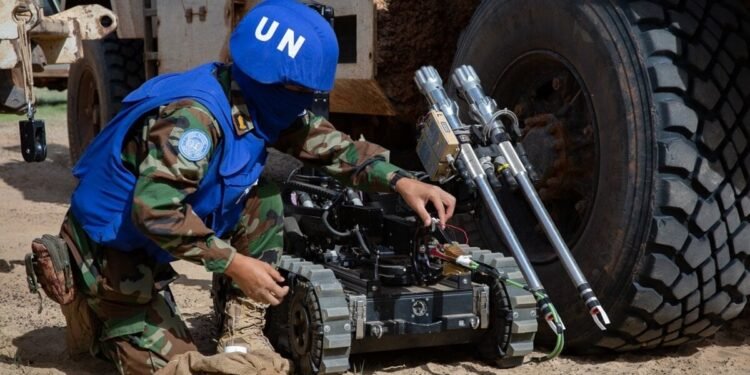
The lifesaving contributions of a Nepali explosive ordnance disposal (EOD) company to operations in landlocked Mali where a United Nations (UN) peacekeeping mission is withdrawing ahead of a year-end deadline bear testimony to dedication, preparation and skill.
Acknowledging the “significant contributions” of the Nepali EOD company, the Mali Mission – MINUSMA – reports its core mission of mitigating the improvised explosive device (IED) threat was executed professionally under difficult conditions.
“The challenges posed by these explosives, as well as the casualties and injuries suffered by peacekeepers, underscore the difficult operating conditions they endure. IEDs have tragically claimed the lives of 109 peacekeepers. The highest number of IED-related casualties in a single day was recorded on 18 September 2014, when five Chadian peacekeepers died in an IED attack,” MINUSMA said.
“To date this year the Nepali EOD company recorded 62 ‘major assignments’ spanning convoy support and post-blast investigations to hands-on IED disposals, including in March, when they neutralised two intricate remote-operated IEDs found close to their Kidal base,” the mission said, adding recently the Nepalis “intervened” when MINUSMA withdrawal convoys were the target of IEDs.
“These incidents,” according to MINUSMA, “are a sad reminder of the high risks the mission has faced over the past decade and is still facing as it draws down”.
Since MINUSMA’s establishment 10 years ago, IED and landmine attacks consistently targeted convoys and patrols, particularly in the north and centre of the country. The use of IEDs by armed elements in these regions affected human security, the mission said, pointing out since January 2018, 696 civilians and 390 peacekeepers were injured in IED explosions, with several injuries during the drawdown.
Stationed across key locations in the northern regions of Mali — including Kidal, Aguelhok, Tessalit, and Gao — the Nepal EOD company arrived in Mali in February 2014. The deployment was in response to MINUSMA’s increasing challenges with mines and IEDs. Each EOD team unit is a blend of specialists from searchers, operators and medics to drivers and gunners. The team is ready to respond to IED alerts or findings within 15 minutes. They prioritise convoy safety, conduct comprehensive investigations and execute necessary disposals.
The EOD company’s proficiency extends beyond meticulous investigations. They are well-equipped to manage complex disposal operations. EOD operations involve dealing with explosive devices such as IEDs, mines and unexploded ordnance, all of which pose significant risks to human life. In situations where convoys face explosive threats or detect IEDs, immediate safety protocols are activated. EOD experts evaluate and subsequent steps involve secure neutralisation of IEDs, facilitating onward convoy movement.
Nepal contingent commander Lieutenant Colonel Bibek Kafle says of those he commands: “The team dedicates each day to training. Whether in active deployment or at headquarters, they never cease honing expertise in IED management. This relentless pursuit of mastery ensures they are adept at managing real-world challenges”.
“In a typical training setup, we place IEDs and assorted wires. The goal is for personnel to identify these threats, while the operators manage a remote operating vehicle (ROV). This rigorous practice is testament to our dedication to readiness. Our near-decade track record, especially in IED disposal, is further testament to our company’s exceptional capabilities.”










